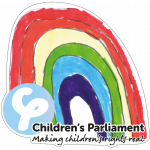
In November 2021 our Co-Director, Colin, was invited to meet the Scottish Parliament’s Education, Children and Young People Committee as a witness to support the Committee’s exploration of the impact of Covid-19 on children’s attainment, particularly for those impacted by poverty. Colin began with a review of learning from our Children and Coronavirus work, which was carried out from Spring-Autumn 2020, and provokes our thinking on what a so-called “education recovery” might look like from a learner’s perspective. Colin calls for a system that more evidently acts in the best interests of the child.
During 2020 Children’s Parliament’s national survey How are you doing? provided children age 8 to 14 with an opportunity to report on their learning, life at home, friendships, worries, what makes them feel better and their physical and mental health and wellbeing. The survey was conducted at four points throughout 2020 and over 12,000 responses were collected from children across Scotland. The surveys consisted of a set of statements with an agree/disagree scale. Throughout this period Members of Children’s Parliament (MCPs) also reported as journalists, sharing their personal experiences of the period via the Corona Times Journal.
– Children and Coronavirus – Children’s Parliament (2020)
What did we learn?
As the first period of ‘lockdown’ came to an end in June 2020, the conclusion drawn was that most children did not like the home-learning model and many struggled to engage. Some of this struggle was about families not having the tech required in those early months, but many children who were previously known to Children’s Parliament and had been struggling with engagement in school and learning anyway, simply got lost in those early months. From our survey, we learned that only a minority of children felt that they had a choice in what they were learning, and there were increased levels of boredom and a decline in the numbers of children who reported having fun things to do in their days. Across the initial lockdown period, children were less likely to ‘try their hardest’ or ‘feel pride’ in what they did. Doing schoolwork became something that children worried about increasingly. By summer 2020 Children’s Parliament was identifying that whatever model of home or blended learning was to be used in the school year 20/21, the experience of children suggested there was much work to be done to improve the educational offer and how children were supported to engage.
As we reflect on learning during 2020, we also need to acknowledge the broader context, and through the year we learned much from children about mental health and wellbeing, exploring mood, and a sense of self-efficacy in terms of choices to support mental and physical health. Throughout the period of consultation, children reported a decline in mental wellbeing, fewer generally felt cheerful and in a good mood, and they had less energy. Children told us they felt increasingly lonely and less sure that ‘even if I am having a difficult time, I feel I will be okay’.
Children also became increasingly worried about a number of things. As time passed, they worried more. Most children had someone at home or external to their family to speak to, but a significant minority indicated they did not have anyone. Children also identified a number of things that supported their wellbeing and help them feel good but as time passed children identified fewer things that made them feel good. A significant number of children reported a sedentary lifestyle during the lockdowns.
All of these factors may have longer-term impacts on physical and mental health and wellbeing, and therefore also on learning.
Our survey work and Journal pointed to a particularly significant negative effect of lockdown on girls aged 12 to 14. Girls in the early years of secondary school were most likely to feel bored, to feel lonely, and to say that that there were a lot of things that they worried about in life, and to worry about their own health. They were least likely to report having fun things to do in their day,or be proud of things they could do. They were least likely to feel they had a choice in what they were learning, to feel cheerful or in a good mood, or to feel that ‘even if I am having a difficult time, I feel I will be okay’.
As we published the final data in November 2020, we were more aware than ever that there is no simple path for what might be considered recovery, although we hoped that the return to school and reconnecting with friends and some family members might see some improvements in children’s self-reported responses. Reporting during late 2020, we found that some aspects of life were improving, but some were not. This left us with a strong sense that rather than identify that some things became problematic because of lockdown, perhaps lockdown simply exacerbated or just exposed what was already there, what was already troubling about children’s lives. So, by way of some examples and with a focus on school and learning, late in 2020 we collated the following responses:
Poverty is the greatest of rights infringements.
Poverty is about low income for a family, but it is also about other forms of deprivation and a loss of dignity and respect. The Joseph Rowntree Foundation reminds us that using human rights as a lens through which to view poverty, entails a shift from needs to socially and legally guaranteed entitlements, and from charity to duty[1]. Our How are you Doing? surveys tracked the experience of poverty by asking children aged 8 to 14 whether they agreed/disagreed with the statement I think my parents/carers worry about having enough money for our family: 29% of children agreed. We also asked children if they ever worried about a number of things, one of which was money problems. During the first months of lockdown, 17% of children identified this as a worry. By our October survey, this had risen to 23%.
What might any notion of educational recovery look like?
First of all, we need to centre our thoughts and actions, our intent, on learners. This needs to focus on relationships and rights. We are concerned that a narrative framed by the idea of ‘lost learning’ focuses more on the needs of the system to be seen to be meeting arbitrary results in terms of attainment regarding literacy or numeracy or exam results, rather than the needs and wellbeing of children. Children’s recovery will not be evidenced by improved test results in a spreadsheet.
At Children’s Parliament, when we work with children we talk about rights-based relationships.
These relationships are based on kindness, empathy, trust, and the core idea that runs through all human rights instruments, human dignity. When children and adults learn what human dignity means to them, this is transformational. We have a strong sense that teaching and learning through 2020, in the face of all the challenges, became more focused on relationships, on looking out for each other, and maintaining nurturing, loving human relationships. It is as if many educators either remembered or felt empowered to explicitly acknowledge that teaching and learning are relational. When learners feel seen, they connect with the teacher and with learning.
We cannot underestimate the pressures and stress on school staff as they manage the complex mitigations required by this past year, whilst also being individuals with their own worries and anxieties about the pandemic. But it is concerning that we are hearing from teaching colleagues and support staff that the space they created in the past 18-months to focus on wellbeing and on the needs of the most vulnerable, is now being squeezed because of pressures around attainment.
Being rights-focused means building a system that is directed to the purposes described in Article 29 of the UNCRC.
With the UNCRC’s incorporation, the will of the Scottish Parliament, this becomes law. Children’s Parliament is working alongside colleagues to build capacity in schools and early learning establishments to understand what must be done. This is not negotiable, children’s rights are a minimum set of entitlements, sometimes referred to as the floor, not the ceiling.
| Article 29 1. States Parties agree that the education of the child shall be directed to: (a) The development of the child’s personality, talents, and mental and physical abilities to their fullest potential; (b) The development of respect for human rights and fundamental freedoms, and for the principles enshrined in the Charter of the United Nations; (c) The development of respect for the child’s parents, his or her own cultural identity, language, and values, for the national values of the country in which the child is living, the country from which he or she may originate, and for civilizations different from his or her own; (d) The preparation of the child for responsible life in a free society, in the spirit of understanding, peace, tolerance, equality of sexes, and friendship among all peoples, ethnic, national and religious groups and persons of indigenous origin; (e) The development of respect for the natural environment. |
It is in this Article that we see recovery.
All the problematic aspects of what has been reported through 2020 and into 2021 are addressed by an educational experience so defined. When we design, resource, and deliver this educational experience for every child, then we fulfil our responsibilities as duty bearers, and children experience their rights as human-rights holders.
So, what does educational recovery look like from the learner’s perspective?
From work in the past year, the following calls to action have been shared by MCPs. They are not the full detail of what children have called for in two major reports[2] but are provided here as examples of what children want from the system; they make a rights-based school experience very real. Why wouldn’t we commit to these actions and others like them as the essence of educational recovery?
As an example of one MCP’s reflection on a teacher who they love:
“So my teacher knows what children like and doesn’t get mad. He’s engaged in any learning; he’s not like some teachers, who sit down, give you a sheet and that’s it. He actually engages and does fun stuff. He’s not one of the teachers who doesn’t give you help during the class. If you need help or if you ask him about anything, he’ll try to respond the best he can and try to help you. He makes children feel good about themselves and everything is happy and good around the teacher.”
Member of Children’s Parliament, age 11
There is a plethora of workstreams and actions coming out of reviews of Curriculum for Excellence, the roles and functions of major institutions in the education system, and of course work around pandemic recovery. Children’s Parliament offers the view that unless there is some common thread that connects this work – and that common thread to us must be relationships and the rights of the child – we will fail to properly acknowledge the experience of children in the past 18 months. We will find ourselves building a recovery that is about the system rather than the learner. In itself it is becoming a bit of a cliché, but building back must not mean ‘getting back to normal’, because for many children ‘normal’ was not good enough in the first place.

Thanks: Our 2020 programme of work on the impact of coronavirus on children was supported by Scottish Government and Public Health Scotland.
[1] Poverty, inequality and human rights from the Joseph Rowntree Foundation
[2] Children’s Parliament Investigates our Health and Wellbeing Curriculum (PSE Review) (September 2020)